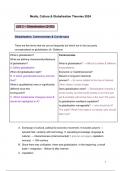Media, Culture & Globalisation Theories 2024
LES 2 – Globalisation (21/02)
Globalisation: Controversies & Cul-de-sacs
There are few terms that we use so frequently but which are in fact as poorly
conceptualized as globalisation (A. Giddens)
What is globalisation? Controversies
What are defining characteristics/features
of globalisation? What is globalisation? → difficult to define & different
A. Define globalisation interpretations
When did globalisation start? Economic or multidimensional?
B. In which year/decade/century and why Recent or long-term historical
then? process? → for some related to the rise of internet.
What is (qualitatively) new or significantly Other claims it exists longer
different since this Does globalisation exist? → Globalization towards a
turning point? world society, but that world society is not here just
C. Which fundamental change(s) since B yet & probably will not be here in the next 100 years
should be highlighted in A? Is globalisation neoliberal capitalism?
Is globalisation manageable? → who should do it?
The state? What if the state is on retreat, who should
take over?
A. Exchange of cultural, political & economic movement. It includes powers →
spreads fast, certainly with technology ⇒ spreading knowledge: language &
cultural. → Interactiveness (interconnected) = grenzen vervagen, capitalism
(money) → 15th century
B. Since there was civilization, there was globalization. In the beginning, a small
trade = integration. - Before & after internet.
C. Capitalism
1
,Cul-de-sacs/redundant concepts
What Jan Scholte claims Globalisation is not: 4 cul-de-sacs = dead ends → when
talking about golbalisation, we talk about earlier concepts: when u define
globalisation as something, but it is in fact internationalisation or westernisation, it
does not bring new knowledge or indicates what is fundamentally new about
contemporary times → that why he calls them redundant concepts or cul-de-sacs
(dead ends)
Most existing analysis of globalisation is flawed because it is redundant →
‘globalisation’ no analytical added value
1. Internationalisation
2. Liberalisation
3. Universalisation
4. Westernisation
1. Cul-de-sac: Internationalization
- Growth of transactions and interdependence between
countries
- Quantitative approach and measuring (eg. the global
top 20, global cities, countries that are most involved in
globalization)
- Minimum intellectual and political adjustments is
necessary
- ‘The new’ understood in the familiar
- Replay of historical scenarios
- Why bother then? → because it’s just a new form of globalization, so why call
it internalization
2. Cul-de-sac: Liberalisation
● Globalization understod as Process of removing officially imposed restrictions
on movements of resources between countries towards a borderless world
2
, economy → approach doesn’t indicate what is fundamentally new about
globalization
● Debate about contemporary neoliberal macroeconomic policies
○ Neoliberalism as only available policy framework for global world is
potentially harmful
● Positive vs. negative assessments
○ Borderless world, peace, prosperity (positive) vs poverty, inequality,
ecological damage, deglobalization (negative) etc.
● Why bother then? → around 1900, time of increased liberalization (breaking
down tariffs and restrictions)
3. Cul-de-sac: Universalisation
● Globalization seen as the Process of dispersing various objects and
experiences to people all over the world: more related to culture, conscience,
relations amongst people, for identity
● Homogenisation and convergence
○ Cultural, economic, legal, political
● Why bother then? → in ancient times with Slik Road there was process of
dispersing various objects and experiences to various people all over the
world (maybe on smaller scale) (increasing interconnectedness)
4. Cul-de-sac: Westernisation
● Globalization seen as A particular type of universalisation, in which the
structures of modernity are spread all over the world (structures of modernity
= the Enlightment, rationalisme,
processes of urbanization and
secularization, individualism &
capitalism etc.)
● Imperialism, rationalism, consumerism,
colonisation & Americanisation,
capitalism, urbanism, industrialism
3
, ● Hegemonic discourse, ideological discourse
○ But there are also emancipatory & exploitative transworld social
movements, actors, & processes
● Why bother then?
Timing of globalization
1. Prehistoric (5000 BC) first global dispersion of species, new trade routes,
Sumer & Indus civilizations
2. Premodern (3500 BC-1500) Roman Empire, Mongolian empires, Silk Road,
the plague (diseases travelling), cultural exchanges
3. Early modern (1500-1750) Geographic & scientific discoveries, metropolitan
systems, foundation of capitalist world system…
4. Modern (1750-1970) industrial revolution, world trade, multinationals,
money/Gold standard, colonialism, technological & communications
innovations, population growth… => A lot of people say that globalization
started here
5. Contemporary (1970 -) – enhanced global data flows, acceleration of trends
(ICT & internet), ‘something new’? A more recent thing
● Dependent on definition
● Different periodisations exist alongside one another
● Periodisation is artificially neat
● Globalisation is not necessarily linear
● Measuring globalisation is difficult
○ Absence of global statistics – national and international data
● Dependent on quantitative and qualitative assessments
● Dependent on the argument one aims to make
4




